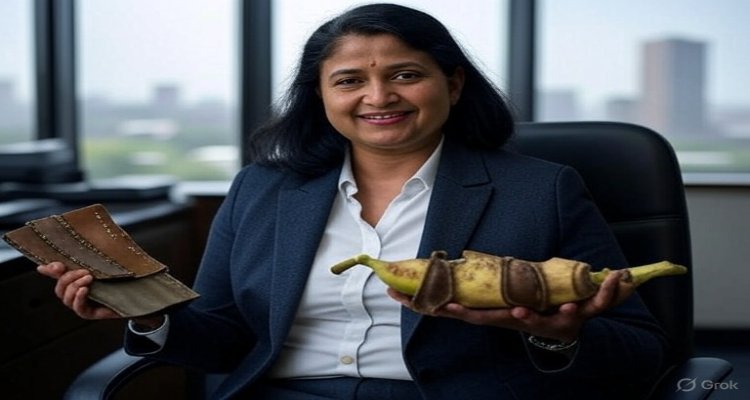Indian Entrepreneur Jinali Mody Wins UNEP Young Champions of the Earth Prize

Indian innovator Jinali Mody, founder of Banofi Leather, wins the UNEP Young Champions of the Earth Prize 2025 for creating eco-friendly leather alternatives from banana crop waste.
A Trailblazer from India on the Global Stage
At just 28, Indian entrepreneur Jinali Mody has secured one of the world’s most prestigious environmental honors — the United Nations Environment Programme’s (UNEP) Young Champions of the Earth Prize 2025. Recognized alongside two other international innovators, Mody’s achievement highlights how grassroots entrepreneurship can create scalable solutions to global climate challenges.
Her company, Banofi Leather, transforms agricultural waste from banana crops into sustainable, cruelty-free alternatives to animal leather. This innovation not only reduces reliance on resource-heavy traditional leather production but also empowers women in manufacturing and rural farming communities.
UNEP’s Flagship Prize for Young Environmental Leaders
The Young Champions of the Earth Prize is UNEP’s flagship initiative for youth engagement. Since 2017, it has celebrated 30 young leaders under the age of 30 — entrepreneurs, scientists, and activists — who are redefining how humanity tackles the climate crisis.
Winners are selected for their groundbreaking projects that tackle what UNEP calls the “triple planetary crisis”:
- Climate change
- Nature and biodiversity loss
- Pollution and waste
Each recipient receives seed funding, mentorship, and access to a UN-backed network of experts to scale their solutions.
In 2025, the prize recognized three innovators:
- Jinali Mody (India): Founder of Banofi Leather, advancing sustainable materials in the fashion industry.
- Joseph Nguthiru (Kenya): A climate-tech engineer pioneering water conservation technologies.
- Noemi Florea (United States): A young climate innovator focused on renewable energy and community resilience.
Banofi Leather: Turning Waste into Opportunity
Mody’s Banofi Leather represents a breakthrough in both environmental innovation and social impact. Conventional leather production is notorious for its high water usage, toxic chemical waste, and greenhouse gas emissions. By comparison, Banofi Leather’s process:
- Uses agricultural byproducts — banana crop waste that would otherwise decompose and release methane.
- Reduces water consumption drastically compared to animal leather tanning.
- Cuts toxic waste and carbon emissions tied to livestock farming and industrial leather processing.
- Promotes women-led entrepreneurship in the fast fashion industry, where sustainability is often sidelined by profit-driven trends.
By aligning environmental stewardship with economic opportunity, Mody’s work illustrates how climate action can be deeply practical and scalable.
Expert Voices and Global Recognition
Environmental experts and sustainability advocates have praised Mody’s recognition as a turning point for India’s role in eco-entrepreneurship.
“Banofi Leather shows how innovation rooted in local contexts can provide global solutions. This is exactly the kind of thinking we need to transform industries like fashion, which are among the world’s biggest polluters,” said a UNEP spokesperson in Nairobi.
Similarly, Indian environmental scholars see her win as an inspiration for young innovators:
“Jinali’s achievement is proof that Indian talent can drive climate-friendly alternatives on a global scale. It’s a wake-up call for industries to embrace circular economy models,” said Dr. Ananya Sharma, professor of environmental studies at Jawaharlal Nehru University.
Why This Matters: The Broader Implications
The fashion and textile industry contributes nearly 10% of global carbon emissions, according to UNEP reports. Traditional leather, in particular, strains water systems, degrades soil, and emits toxic chemicals. By offering a commercially viable alternative, Banofi Leather signals a pathway for the fashion industry to align with climate goals.
Moreover, Mody’s recognition positions India as an emerging hub for climate innovation, with startups increasingly integrating sustainability into their business models. This could influence investment flows, encourage green policy-making, and accelerate India’s contribution to the global climate agenda.
The Role of UNEP: Catalyzing Global Action
Founded in 1972, UNEP has been at the forefront of international efforts to safeguard the planet. From repairing the ozone layer to phasing out toxic fuels, UNEP’s convening power has consistently shaped climate action.
With its headquarters in Nairobi, Kenya, the program today represents 193 member states, focusing on the triple planetary crisis. Through initiatives like Young Champions of the Earth, UNEP provides not only recognition but also a tangible platform for youth-led ideas to scale and impact communities worldwide.
Looking Ahead
For Jinali Mody, this prize is more than an award — it’s a global stage to demonstrate how India’s innovation and entrepreneurship can solve environmental challenges. Her journey with Banofi Leather may also inspire other young leaders to embrace sustainable models that balance profit with planet.
As UNEP continues to champion the next generation of innovators, the recognition of leaders like Mody, Nguthiru, and Florea serves as a reminder: youth-led climate action is not just the future — it is the present.
Conclusion
Jinali Mody’s recognition as a UNEP Young Champion of the Earth 2025 is a milestone for India and a beacon for the global sustainability movement. By converting waste into opportunity, she exemplifies how entrepreneurial vision can drive systemic change.
Her story underscores a powerful truth — solving the climate crisis requires not just policies and technologies, but bold individuals willing to rethink industries from the ground up.
Disclaimer :This article is based on publicly available details about the UNEP Young Champions of the Earth Prize 2025 and the recognized entrepreneurs.










